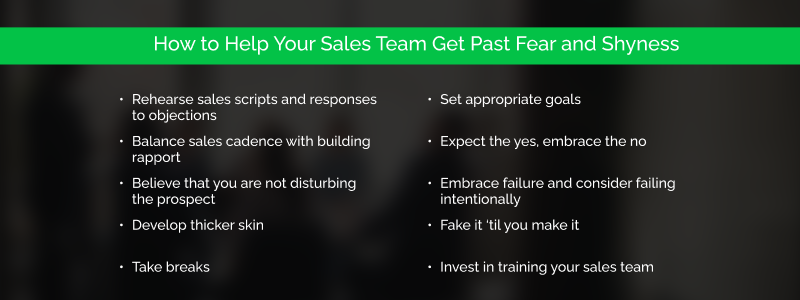How to Help Your Sales Team Get Past Fear and Shyness

Fear and shyness can block employees’ potential, but you can foster confidence in your sales team. Here's how.

Fear and timidity can stymie the success of your sales team and prevent your business from reaching its revenue goals. Salespeople of all levels and experience may occasionally experience fear or shyness. They can pop up when a salesperson is second-guessing after losing a sale.
To grow your business, you need a strong sales team. How can you build and foster confidence in your team? Follow these tried-and-true strategies.
Rehearse your sales script and responses to objections
When you know exactly what you're going to say, you'll approach sales conversations with more confidence. Practice is critical even for seasoned veterans. Have your sales team practice the sales script regularly and prepare for common objections.
Sales-team training should be hands-on. Pair new and experienced salespeople together and have them role-play a sales call or meeting. The new person will learn from the veteran's fluidity, but the experienced salesperson may also learn pointers from for the newbie.
Balance your sales cadence with building rapport
As your sales script becomes second nature for your sales team, they will develop a cadence. This helps the pitch sound natural. Your team shouldn't just power through the pitch; they need to remember they're talking with a person. Take breaks from the script to build rapport with the prospect.
Believe you are not disturbing the prospect
To get past fear, understand that what you're doing is necessary. Your sales team needs to believe in what they're selling. More importantly, they need to believe that prospects need this product or service.
If your sales team thinks they're disturbing prospects, they'll be timid and become more likely to disconnect after the first objection. They need to believe they're not disturbing the prospect; they’re providing the a valuable opportunity.
Develop thicker skin
Salespeople who take rejection personally won’t reach their potential. Rejections or rude behavior don’t reflect on them or your products. Such a response is a reflection of a prospect’s experiences.
Perhaps the prospect had a bad day at work, lost a loved one or is enduring a tough divorce. People in these situations may slam the door, hang up the phone, or speak harshly. Your sales team needs to develop tough skin to shrug off these experiences and move on to the next prospect.
Learn to take breaks
A negative moment doesn't have to end interaction. However, if your salesperson feels drained and overwhelmed, they may say the wrong thing and lose the chance to close the deal. Train your sales team to take breaks.
If they're feeling overwhelmed on the phone, they should put the prospect on a brief hold, take a deep breath, regroup, and resume the call. When dealing with sales prospects face-to-face, your sales team should learn to take a deep breath and regain their composure without disrupting the conversation.
Set appropriate goals
Goals that are too aggressive will make salespeople feel like they are constantly failing. This breeds insecurity and reduces confidence during sales interactions and torpedoes deals. Don't let your team fall into this vicious cycle. Set goals that are ambitious but not unattainable.
Expect the yes, embrace the no.
Your sales team needs to start interactions expecting a yes. This is like visualizing making a free throw in basketball. Imagine success to achieve success.
In reality, every sales interaction won't be successful. Salespeople hear more nos than yeses. When you hear a no, embrace it. An initial no is inevitable, but it certainly doesn't mean the conversation is over. Understand why the prospect is saying no, and train them in ways to get them to yes.
Embrace failure and practice intentionally failing.
To be successful in sales, you have to embrace failure. Salespeople need to see failure as an integral part of their jobs, and even more importantly, learn from it.
You may even want to encourage them to fail intentionally. What if they approach a tough prospect who's already said no to everyone else? Set a goal that's twice as high as their usual monthly target? Or try tactics likely to lead to fail? They won't lose anything, but they could learn from the journey.
Fake it ‘til you make it.
This may sound cliché, but the people say it because it works. When your salespeople smile and pretend they’re happy to be there, they will engage the sales prospect more effectively. In return, the prospect will be respond to their pitch. Just as negativity breed negativity, positivity does the same.
Building a confident sales team with the right training is critical to your success. To nurture your sales team, provide them with adequate training and development. MetaGrowth leverages extensive experience to help clients build their sales teams. Our sales method helps your sales team approach every opportunity with confidence. Ready to grow? Contact MetaGrowth today.
Written by
Joe Arioto
